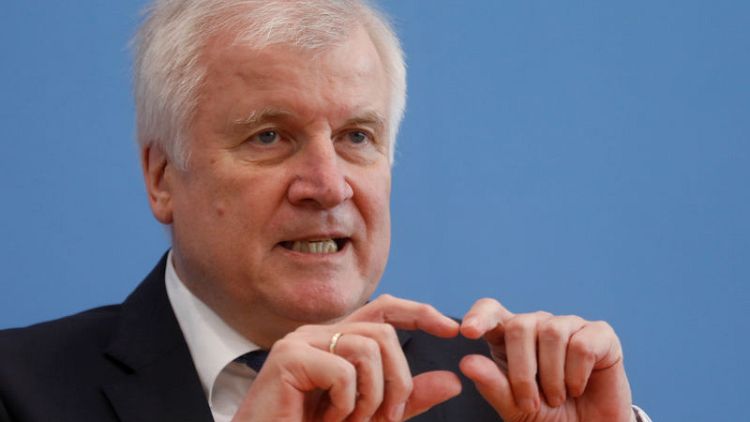By Paul Carrel
BERLIN (Reuters) - Chancellor Angela Merkel's leading critic in her coalition government said on Tuesday he wanted the ruling alliance to work, batting away calls for his own resignation after a dismal result for his party in Bavaria's regional election.
Horst Seehofer, leader of the Bavarian Christian Social Union (CSU), has been a thorn in Merkel's side since 2015, with criticism of her decision to open German borders to almost one million refugees, most of them fleeing war in the Middle East.
But the CSU's disastrous performance on Sunday - its weakest since 1950 - has raised questions about whether he should stand down as party leader and interior minister in the national government.
The calls grew louder on Tuesday, with a senior member of the centre-left Social Democrats (SPD), the junior partner in Merkel's coalition, calling Seehofer "miscast" as interior minister and a senior CSU figure suggesting he should step down.
Seehofer dismissed the idea of resigning, telling a news conference his work in politics "is fun". He said the CSU, sister party to Merkel's Christian Democratic Union (CDU), would act as a stable force in her ruling 'grand' coalition.
"I have no inclination at all for minority governments, or fresh elections and everything that can come with them," he added.
"This grand coalition must simply get on with reputable work and communicate it properly. In the CSU, we will do everything for the grand coalition to stay," Seehofer said.
Thomas Oppermann, a senior member of the SPD, described Horst Seehofer as behaving like a "hooligan" as interior minister and said he was miscast in that role.
The CSU leader was to blame for the ruling coalition's poor image, he said.
PITFALLS AHEAD
CSU honourary chairman Theo Waigel also suggested Seehofer should go: "Everyone has to decide for themselves how to make a graceful, personally responsible departure from politics," he told the Ausburger Allgemeine.
Before the Bavaria vote, the CSU pushed the coalition - Merkel's fourth and probably final government - close to collapsing twice, first in an argument over immigration and then in a scandal over Germany's former domestic spymaster.
The CDU/CSU conservative alliance only teamed up with the SPD to form the ruling coalition in March following an inconclusive national election and the collapse of negotiations between the conservatives and two smaller parties.
SPD members are still bitter over their leaders' decision to join the government after promising before the 2017 election to sit in opposition if they lost to the conservatives. They are now demanding consequences.
The leader of the SPD's Jusos youth wing, Kevin Kuehnert, said his party should give the conservatives an ultimatum: achieve progress on issues such as policy on diesel cars and reducing arms exports, or else the SPD quits the government.
"Deal or no deal, that must be the clear message to the Union parties," he told the Handelsblatt business daily, referring to the CDU/CSU alliance.
Merkel, who has been in office since 2005 and is Europe's most powerful leader, faces further potential pitfalls this year in the form of a CDU conclave and the party's annual congress in early December.
The chancellor, 64, has won support from key conservatives in her bid for re-election as CDU chairwoman at the congress. But this could change if the CDU loses power in the western region of Hesse in another state election on Oct. 28.
(Editing by Angus MacSwan)


